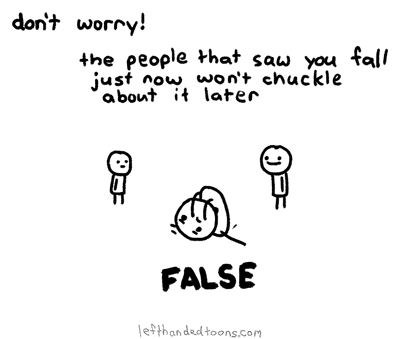
via: Left handed toons People don't actually laugh at our failures
But here's what I do to get over my fear of failure and get started on a project.
Mentally Approaching Failure
During our youth, it seems that many of us were told that talent or intelligence meant never failing, having things come to us easily. Therefore, when we face difficulty or worse yet failure, we question one of the fundamentals of our identity: our talent. The ideology behind this comes from the concept of a Romantic genius, a person with natural talent whose work far exceeds what practice and route learning can achieve in the untalented.
But this is a silly notion. Even the Romantic geniuses had failures!
Friedrich did studies for his paintings; even The Wanderer had its precursor. Chalk Cliffs is nowhere near the statement as the The Wanderer. It's not a shame to the artist that he went through a process of refinement for his ideas. That's what failure is: the process of improvement.Van Gogh did not immediately paint a perfect canvas: often he painted over his failures, adapting them to the improvement of his next work.
Fear of Mockery
Our greatest fear seems to be that we will be laughed at or mocked for our failures.
Let's remember van Gogh. Most art historians lament that he painted over his "failures." They wish that they could see the process that he went through, much as they pour over the sketches of those painters trained by the French Academy.
And okay, somebody laughed at your failure? So what? What are they doing? Instead of taking that time to be improving themselves, they're paying attention to you. If anything, that means that you're already succeeding. You're gaining attention for your new work. You've got an audience for your future success. You're making someone else feel happy, maybe a vindictive happy that reflects on their inner demons, but still happy. So don't worry about it.
The Cost of Failure
"I spent so much time working on it but it didn't turn out right."
"Look at all the money that went into that ugly thing! What a waste."
"My reputation's ruined by that fiasco. No one will let me try again!"
We've all heard or said these things about our own efforts that ended in failure.
But what have we said about the profits of success?
Consider failures investments. Don't jump into large ones; slowly build. Develop a skill. It only takes a single success to put you on the market, but all success requires skill.
In the case of drawing: Start out on cheap newsprint as you learn to draw or paint. Invest in a few nice sketchbooks. When those are filled, you'll see improvement. You'll have the wisdom to choose the style and medium that best suits you. A few quality finished works on canvas will yield more and more knowledge, based on the sketches you continue to do on cheap paper. Finally, you'll have a piece that satisfies you. You can send this succes to a gallery where it may or may not be accepted. But you will always have the skill of drawing, a skill that can continue to grow.

No comments :
Post a Comment